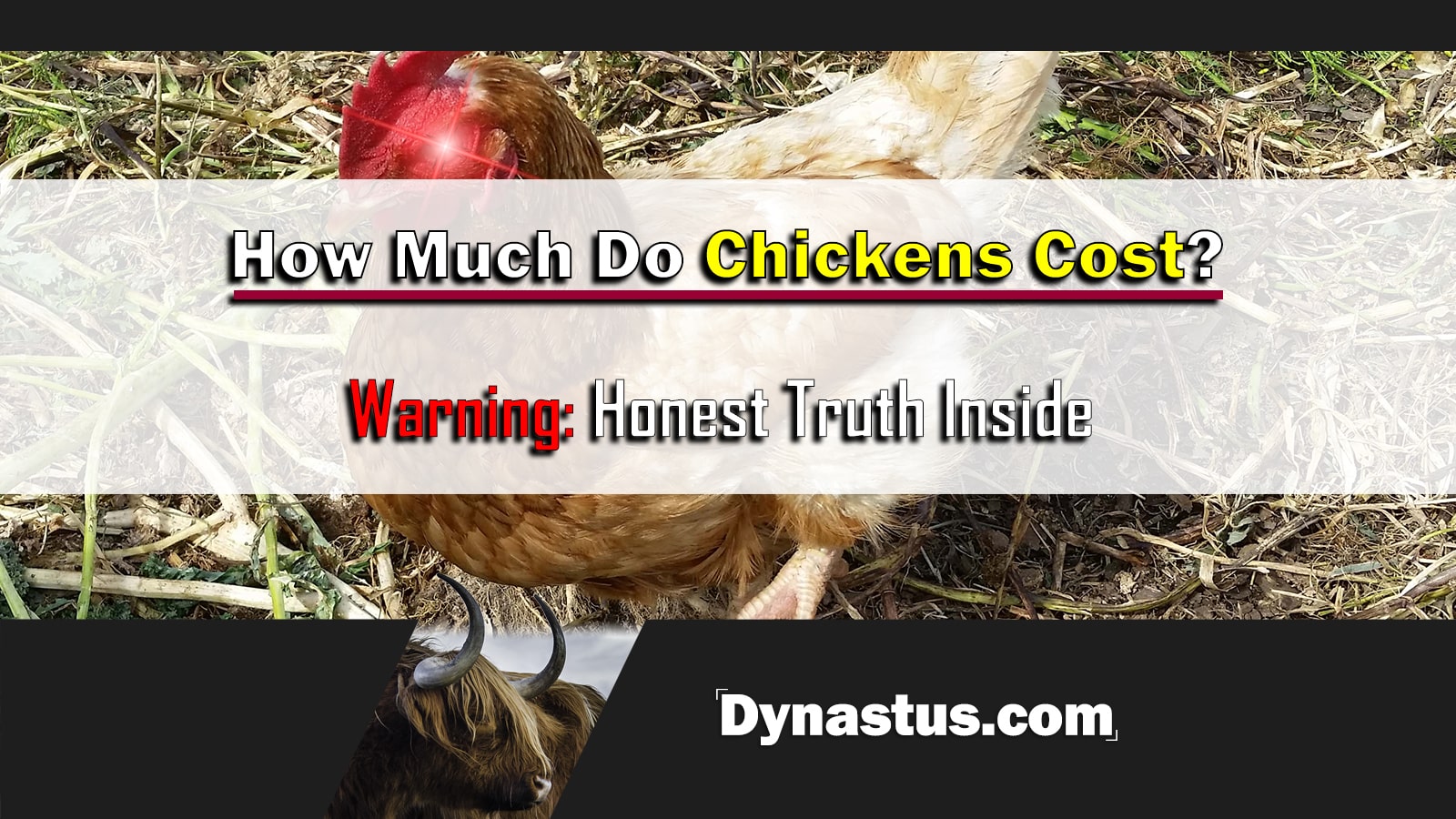
Disclaimer: I am not a financial advisor and this page exists to aid you in your research, but not make or suggest decisions for you. Further research is recommended for you to draw a conclusion of your own. Additionally some links contained on this page may be affiliate links in which Dynastus will receive a portion of sales at no additional expense to you.
Update from 2022 Ben: After moving to our rural homestead (our family sanctuary we’re developing), we have built a large chicken coop and have over 20 chickens we let free range for 90%+ of their food, making them very efficient and giving a great ROI. I realize this isn’t possible for everybody right this moment, but it is an example of how over time you can use what you have to your advantage.
Update from 2020 Ben: We’ve since decided to get rid of our main chicken pen due to the flies they attracted and less time as I turn my focus to scaling our investments and businesses, and my wife focuses more on being a mum to our children. If we go for the chicken approach again, we’ll look at a more autonomous way of doing it, or get them on our family sanctuary we intend to create. I believe for smaller homes, bantam chickens kept in a humane enclosure with easy-to-clean removable trays keeps both the health of the chickens in tact, while providing a mutual beneficial relationship for your flock and your family.
We kept chickens at the Dynastus house in our suburban ‘homestead’. At the time of writing, we’ve had our little flock of 6 chickens for a little over 2 years. So just how much do chickens cost? In short, for a flock of 6 hens, about $680 to set up, give about 3.28 eggs average per day, costing $819.82/year(or 28c/egg) granting an annual ROI of 20% using a margin of safety(a tool in investing, if you’re new) of 20%.
There are definitely hidden cons among the pros. You’ll find arguments for both sides while I take you through the real calculation for the costs I’ve outlined above. I’ve provided a download link for my custom-built calculator which you can download at the bottom of the article. You’ll be able to input your own costs and get a real ROI for yourself. Often times – it doesn’t work out as well as you’d think! You can shoot down and grab it now, but it’s best you have a read first. The calculator will make a lot more sense once you’ve finished. Ready? Let’s do it.
Why Did We Get Chickens?

I’ll start with our mentality – it will help you relate to the rest of this post. We started with the question ‘how much do chickens cost’ so the decision for us getting chickens was mostly financial – though I didn’t realize some of the hidden cons until we were in too deep. I’d always wanted a flock to call my own, as well as all the other basic homestead/ self-sufficiency amenities such as garden, micro orchard, worms, mushrooms, bees, and hedgerow. I’d left my job and this ‘suburban homestead’ setup was a part of my plan to never have a job again.
In order to stretch my dollars further, and reduce the grocery bill I needed lean, mean protein-producing machines. Obviously, being an income investor, chickens fit the bill(passive protein income, lol). At first, we intended to get a mixed flock and picked up just two brown shaver hens, which are well known to be the most efficient breed of laying hens, we got our first egg within a day in our temporary setup – I’m sure it was a stress egg.
Upon reconsidering the question: ‘how much do chickens cost?’, my inner investor looking for the highest ROI kicked in and we wound up getting 4 more brown shavers a week later from the same place. Not as pretty to look at as a mixed flock would be, but the brown shavers provided a way(way) higher ROI. You know I’m all about that alpha return.
It’s important I say that if you do get a mixed flock from different sources, there’s a whole rigmarole of a process to go through to successfully integrate them with one another. Not doing so may result in your chickens getting hurt, sometimes fatally so. This piece is more about cost-benefit analysis. Maybe I’ll write more about keeping chickens in a later article. Let me know if the comments below if you’re into this idea.
Sorry for the portrait photo on the let there – photography blasphemy, but it’s all I have from the time we got our first egg.
The Benefits of Keeping Chickens
Before I answer the question ‘how much do chickens cost?’, I thought it best to go through some pros and cons. There are numerous benefits to keeping chickens. Beyond the positive feeling, you get from knowing your eggs from healthy, well cared for creatures you can look forward to some of the other benefits listed below.
Financial/Expense Reducing
This may seem obvious, but it really shouldn’t be. It isn’t always the case you’ll actually be better off financially by owning chickens. But, more often than not, you’ll shave a little bit off your grocery bill every week. Conservatively, you’ll get about a respectable 20% ROI on your chooks. You’ll definitely get more eggs in the summer than winter – the consistency can be an issue. None the less, if your aim is to reduce your expenses and reduce your financial requirements for leaving your job sooner, chickens are a major shortcut (with a caveat).
Income Source?
If you’ve some friends or neighbors, you can also get away with selling some eggs to them for a bit of extra income. Worth it? Probably not on a small scale honestly, but hey, when you’re aiming for financial independence, every dollar helps. A tray of eggs can mean a bag of flour from the supermarket – and how far does that go?
Great for Kids
Not much warms my heart more than kids gaining a better understanding of the world. Too many children have (literally) no idea where their food comes from, and are in environments where curiosity isn’t fostered – and they don’t even ask. It sounds silly but a kid of a friend had a classmate who thought the beef was the bark of a tree. Pretty tragic. But I digress.
Chickens will give your children a chance to interact with and see the care and effort it takes to raise their own food, as well as learn compassion for their fellow creatures along the way. We’re looking forward to raising our daughter with humility learned from raising animals and plants of her own.
Immune Boosting
I think it’s little known, or at least not often thought of, but having farm animals around exposes you to pathogens you would otherwise never come in contact with. This is both a blessing and a curse. While if you aren’t careful, you could get fairly ill, the only real major (common) risk is from salmonella, which is only found on the outside of eggs.
On the flip-side, a lot of the other less impactful pathogens chickens bring into your life will actually help you build a stronger immune system over time. This leads to epigenetic improvements of your family. If you or your partner is pregnant, barnyard(or some domestic) animals can improve prenatal immune health in babies too. But being full on sick can have a negative effect..go figure.
Nutritional Health Benefits
Aside from potential immune benefits, eating healthy food will reduce doctors bills and potential health problems later in life. While eggs aren’t really going to replace a complete wholesome diet and regular exercise, they can be a cost-saving cornerstone in the nutritional output of your backyard.
Manure
Having free fertilizer is a big plus in any avid gardeners book. While you need to age and mature the manure to avoid ‘burning’ your plants, it provides a TONNE of nutrients for your garden. If you have a compost pile, it’s as simple as tossing the manure in the compost bin on a weekly basis.
Grateful ‘Employees’
If you’re like me, where you can reasonably automate, you will. With a bit of temporary fencing or an A-frame style coop, your chickens will mow your lawn or till your soil for you, all the while eating weed seeds and plucking bugs from the soil. This has the knock-on effect of reducing pathogen and pest build up too, which any gardener will tell you is a major challenge. If you have raised garden beds though, this may result in a lot of soil flicked out of them, which is annoying, to say the least.
Reduce Food Waste
Chickens won’t eat ‘anything’, but they’ll try. You can feed chickens table scraps and reconvert them back into edible food. Not only that but garden scraps can be processed partially by your chooks too. We grow comfrey around the garden border, a plant which mines minerals from deep in the soil. One of the keystones to our intention to improve our garden output, we feed this comfrey to our chooks as a source of trace minerals and additional calcium. We also add comfrey to our worm bin and compost – it helps worms to multiply faster thanks to its high calcium content, as well as boosts compost nutrition and processing speed.
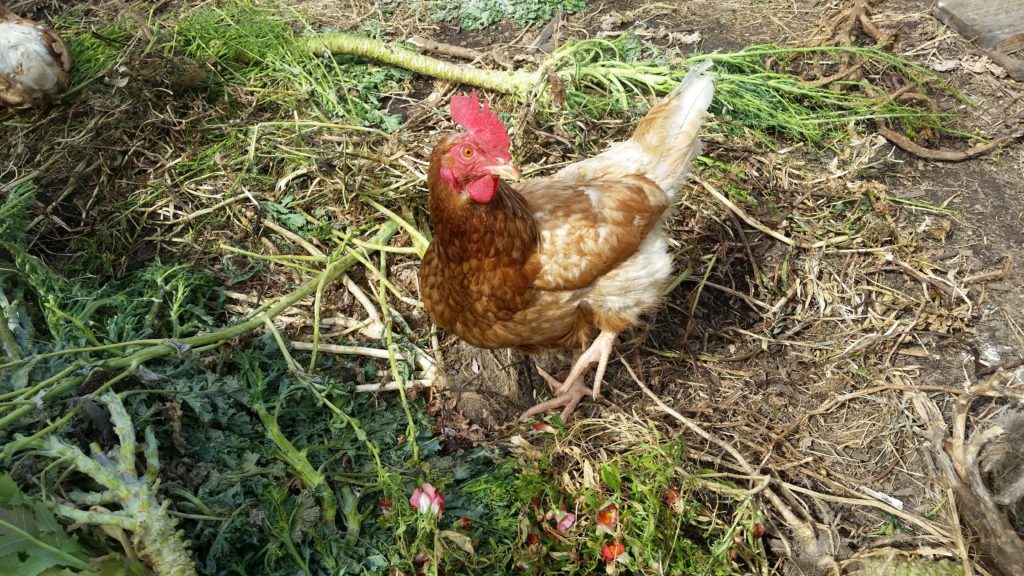
Some more ‘Enthusiastic’ Reasons
Chickens can be entertaining, I’m not 100% sure I agree on this but to each their own. They are actually a pretty good talking point when guests come over. We rarely have people over, but when we do, the chickens inevitably come up, and usually after people ask us “So…how much to chickens cost?” – with a couple of people going so far as adding them to their yard.
None the less, they’re a fun hobby and help curb some of our romanticized country yearnings. Our dog, loves to exert some of his blunt sheep herding ability and round them up if they ever escape their over-sized prison paradise too, so if you have a gentle natured dog, then they can be a great companion.
The Hidden Cons
Ah yes, what they don’t tell you. How much do chickens cost? Well the monetary side is simple, but there are some drawbacks that aren’t often discussed. Once you’re done reading here you’ll know what to really expect. There are little-hidden things you just don’t think of. But good ol’ Ben is here to shed some light on the dark side of chickens.
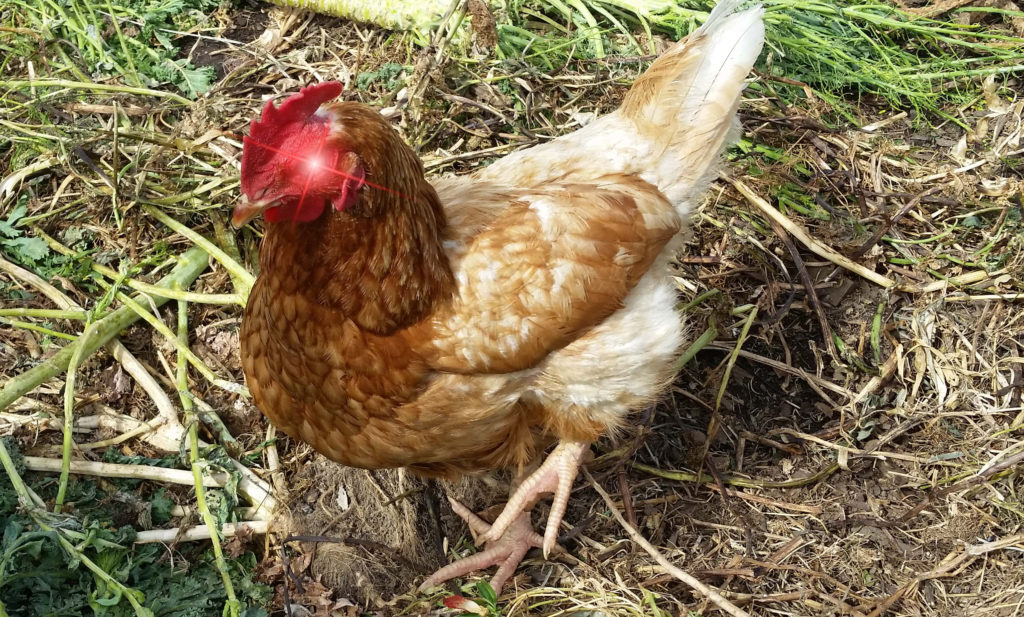
I knew I saw the evil in her eyes!
Space They Take Up
Chickens don’t really have to take up a lot of space. But…they do. If you have a small coop or a-frame run, you need to move it around a lot, or else you’ll get pathogen build up and then sick chickens. If you want to let them free roam your yard, they’re going to demolish your gardens as frequently as they can. Not a problem if you aren’t a gardener though. On the other hand, if you do make a large pen and lay down mulch for them to scratch around in, they’re going to need a fair bit of space, as below.
Which gets me to my next point…
Chicken Wastelands
Chickens are HARD on land, and I mean HARD. If you keep them penned up in one space, they’re going to get strip it bare, then wear it down in the never-ending search for more morsels of food. You can throw as much feed around to keep them occupied as you like, but that will only speed up the process I’m afraid.
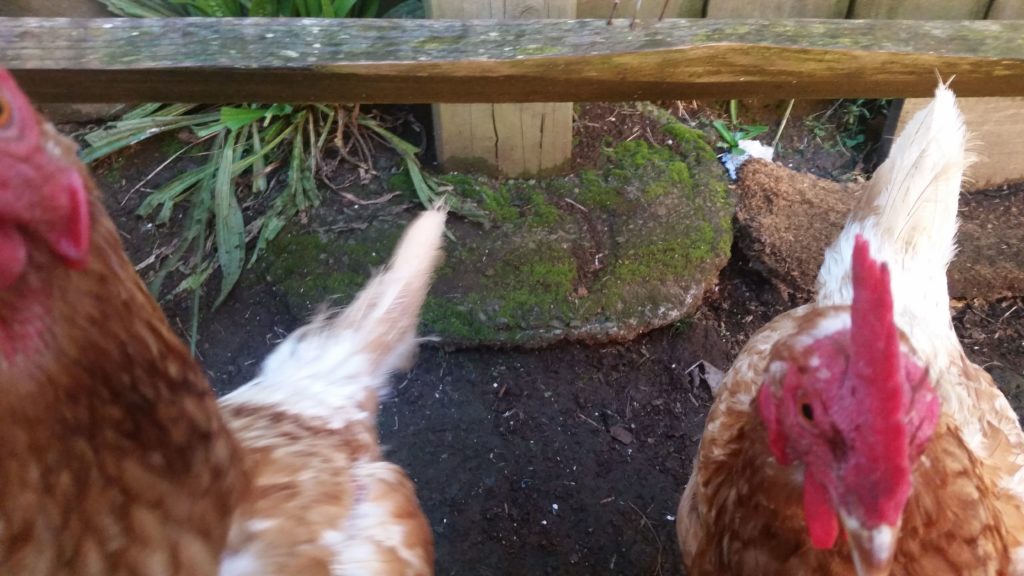
It’s 7:30 pm and the sun is nearly set – hence the darkish photo. And that cheeky hen on the left just pecked me too.
The concrete base for the fence post featured above used to be underground, while I never had to replace it, this is antoher thing you must factor into the “how much do chickens cost?” question. When we set the pen up I was worried I put too much mulch down, the mulch has now all broken down and we’re left with near barren soil.
The cost of this can be difficult to measure really, but needless too say, we need to put some more mulch down or we’ll wind up with a crater in the yard. Our pen used to be much larger, but we converted half of it into a barrel orchard. As we expand and establish our orchard, we’ll move the trees into the chicken pen though, that will save on space.
2022 update: We eventually put the chickens in an a-frame, and planted tress in this space. The grass and trees planted here exploded in growth due tot he increased fertility of the area.
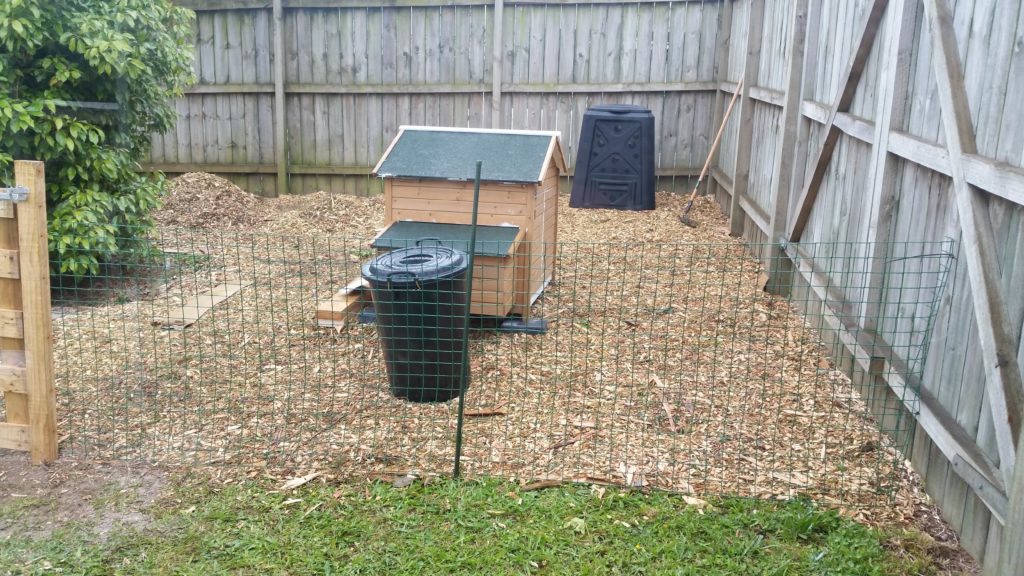
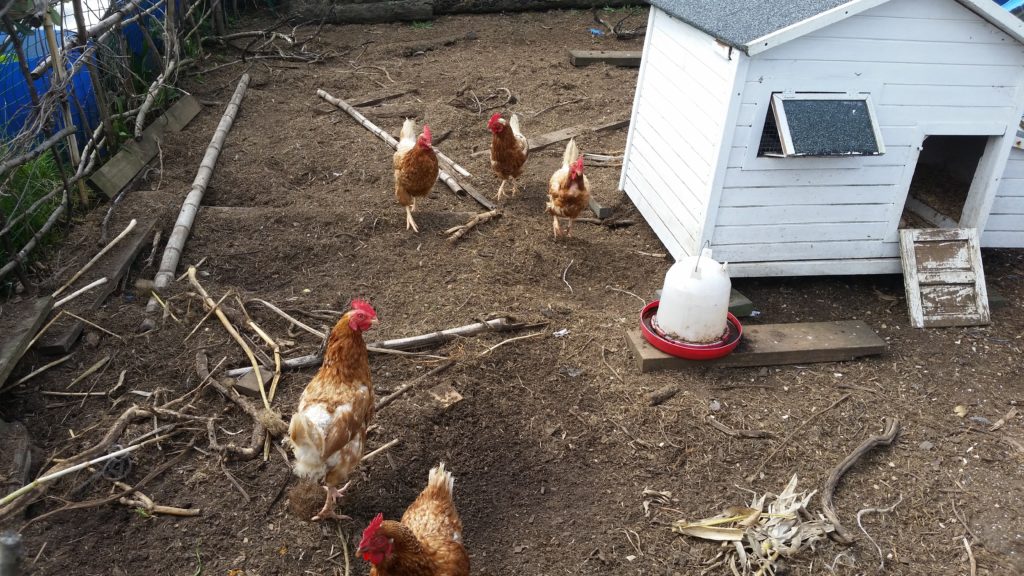
Flies Flies FLIES!
Ask Mrs. Black – this is a big one for me. While our chicken run isn’t a breeding ground, it certainly attracts flies – and a lot of them. It’s humid where we live so that certainly doesn’t help either, but flies are a definite problem. If your pen is close to your house, be prepared for some frequent fly poop scrubbing. Outside and maybe even inside – yuck. Now we have a rural homestead, flies are just a part of life, but you still do not want them in the house.
That Home-Bound Feeling
Not as big for me, but it is still something to think about. Unlike dogs, you can’t take chickens away with you, and they need to be locked up and let out daily as well as fed. If you’re on good terms with your neighbors(you should be) then they shouldn’t have much of an issue helping you out here as it isn’t a big deal. Either way, its just another factor in the question “how much to chickens cost?”.
Automatic devices can take care of this – I think about building them rather frequently. You can flip this too, if you’re introverts, they can be a good excuse to escape awkward social gatherings (though they’ll make you seem more awkward potentially). Just a thought.
Potential Health Risks
I earlier spoke about how they can help bolster immune health – the opposite can be true too. If you have a weak immune system, or you aren’t a meticulous hand washer, you may expose yourself to some pretty nasty bugs. This includes salmonella, which it pretty horrible to have – or so I hear. Something to think about for sure.
Bloody Pigeons!
Pigeons for all of their intelligent merits are a pest. They will find your chicken pen, they will eat the food, they will give their mites and diseases to your chickens. Unless you live in a glass bubble or in a place with no pigeons(sign me up) they’re going to be a problem.
Oh not only this, the pigeons are going to eat the food, then fly up on your roof and deposit it up there in the form of acidic poop. Which if your roof is metal(like mine), will in time corrode it. I’d just bloody painted mine only to go out to see a battalion of pigeons firing out of their butt cannons onto the nice black roof. Another hidden little cost to consider but not to be calculated.
Time Consumption
This is debatable. In my opinion, chickens take up very little time, but then again, my wife is the one who handles the chicken arm of our empire. She says she spends about 30 minutes a week on them. This would be a fair assumption, though others say they may spend an hour or three. These are chicken enthusiasts, however, so I’d argue there’s a bit of leisure involved for them too – my wife is all business.
How Much Do Chickens Cost, Really?
The basics of the formula are as follows:
Total Outlay Cost(CAPEX)
Formula: Coop + (Cost of Chicken * Number) + Vehicle Cost to Pickup Everything + Food and Water Bowl + Fencing(if any) + Time Value to Set Up = Total Outlay Cost
The reasoning here is that everything you put in(including your time) has value. You can call this your CAPEX if you will. You can really input what you like for this, but to keep it simple, I’ve made it $20/hour, and 10 hours of set up time. Value it at zero if you really like and call it a hobby, but your time has some value really. Your vehicle also cost money to drive around. More on that and how to calculate in another article.
Average Daily Eggs
Formula: Estimated Daily Eggs * Number of Chickens / 365 * (1 – Margin of Saftey) = Average Daily Eggs
This will tell you how many eggs to expect on average. By True investor standard, you should factor in a margin of safety here. The calculator uses a standard 20%, which I use in most all of my investment calculations.
Cost Per Egg
(Feed Cost per pound / 4 * Number of Chickens + (Time Cost per Week + Wood Shavings) / 7) / Average Daily Eggs = Cost Per Egg to Produce
This is going to spit out how much each egg costs you to produce. You’ll also need to know how much an egg costs from your local grocer/supermarket. To work tat you just divide cost of the total amount of eggs, but the total number of eggs. Wood shavings are assumed to be changed once a week, and you’ll need to factor in the cost of the time you spend with your chickens each week. To reduce this significantly, you should try and find a free source of shavings – try your local woodworking shop or furniture maker or lumber yard. They usually cant wait to get rid of the stuff!
ROI
(Cost of Egg At Grocer – Cost Per Egg to Produce) * Average Daily Eggs * 365 / Total Outlay Cost = ROI(Return on Investment) expressed in %
Here’s where things get interesting. Your ROI or your Return on Investment Per Annum. This above calculation is basically your efficiency. In my calculation, I got 20.92%. If you divide 1 by this number, its the number of years to break even on your investment. To get this up, you can reduce your input costs, get more chickens, of supplements feeds to reduce food costs. Considering most average investors expect a 7% average return with ‘safe index funds'(cough bs cough), 20% is pretty good. Of course, you can’t really look at it as an ‘actual investment’, but its interesting data to answer the ‘how much do chickens cost?’ question just the same.
Alternatives?
I’ve actually had ducks in the past when I lived with my parents(against their wishes), and they were a huge pain in the butt. If I had to pick again now though, I’d probably get ducks based on the current yard we have. They are far less destructive, and more symbiotic with the garden when compared with chickens. They do get pretty stinky, and still the bane of flies is an issue. But with the full size of your garden to explore, this should be far less of a problem. Male ducks(drakes) are also quiet – the female ducks are the noisy ones(not rooster grade though). This means you could breed them in a city/town with little complaint from your neighbors – another income source or protein source(if you have the heart for it).
Something to think about anyway. The calculations above will work for them too, but maybe I’ll do a specific post on them another time – we’ll see.
Other protein alternatives or small livestock you can raise at home include quail, rabbits, guinea pigs, insects(yep…dunno about this one), fish(aquaculture) or goats – if you’re in that kind of place. Sure there are more, but that’s enough to think about I think.
So, How Much Do Chickens Cost?
Now you’ve gone through this exercise, how much do chickens cost? If you’re looking to quit your job to live an alternative lifestyle, chickens can be a great shortcut(though not your only one, of course). With proper tweaking and management, they’ll shave a bit off your living expenses, in exchange for a bit of dirty work, some flies and a little time. But leaving your job sooner means you get so much more time back anyways.
I realize I can sound a bit one-sided at times, but this site isn’t really for glossing up reality. Nothing worth having comes easy or without input. Realizing what goes into something can make you realize if you’re happy with the return financially, chronically, peace-of-mind…ally or otherwise. These are barnyard animals after all, and we all know what people say about barnyards.
Anything I missed or was I a little harsh? Have chickens of your own and want to spill some truth bombs? Let me know in the comments below.
Thanks for reading. Yours,






